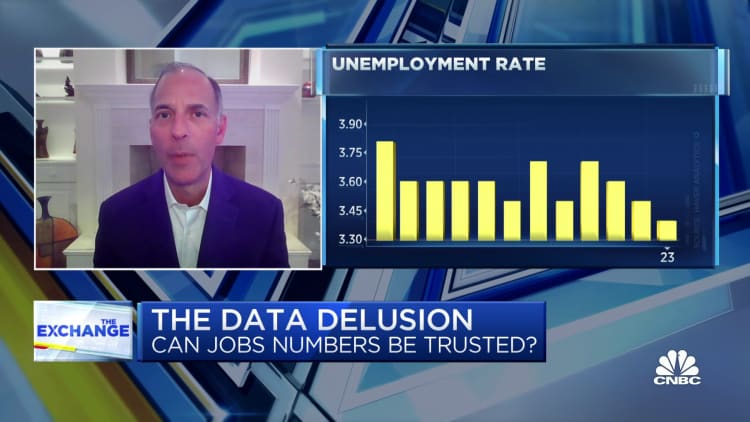[ad_1]
A pre-screen with human resources. A call with the hiring manager. Followed by six half-hour interviews that stretched across three days.
That’s not all — a written case study exercise, before yet another interview with the hiring manager.
And finally: one last round with the CEO.
That makes a total of 9 interviews, for a job that 32-year-old Ayomi Samaraweera said she did not eventually get.
“I enjoyed all the conversations I had with the team but the process was draining and there wasn’t any clarity around compensation of the role upfront,” she told CNBC Make It.
“Or clarity of what the process would look like from my first HR call — for example, they didn’t mention there would be a case study.”
Samaraweera’s frustration in her job search is not an isolated incident.
Experts that CNBC Make It spoke to said they’ve observed a “significant increase” in the number of job seekers facing an extended interview process over the past year.
“It seems to be a growing trend across various industries, with candidates being subjected to more rounds of interviews and rigorous testing than ever before,” said Steven Leitch, a career coach and resume expert.
According to a June report from the Josh Bersin Company and AMS, a workforce solutions firm, the amount of time it takes to hire a new employee reached “an all-time high” in 2023.
Make no mistake, the hiring market is not going to get easier any time soon.
Jim Sykes
Global managing director of client operations, AMS
The report showed that average time-to-hire rates for the first quarter of 2023 increased across all industries by one day — pushing the recruitment process to 44 days on average.
“As our data shows, time to hire has risen consistently for the last four years. Make no mistake, the hiring market is not going to get easier any time soon,” said Jim Sykes, global managing director of client operations at AMS, in a statement.
Why interviews are getting longer
While there is “no specific formula” for an acceptable number of interviews, individuals CNBC spoke to said that 3 to 5 rounds is reasonable for non-managerial positions.
“This allows companies to evaluate candidates from different perspectives while respecting the candidate’s time and maintaining an efficient hiring process,” said Leitch.
But the growing phenomenon of lengthy interviews reflects the highly competitive nature of the current job market, he added.
“With the rise of remote work and a larger pool of talent accessible to companies, they are increasingly cautious and seeking more ways to assess candidates thoroughly.”

Economic uncertainty has also created an atmosphere of anxiety for companies, especially with hiring, said Richard Lambert, a resume and workplace expert.
“Hiring, onboarding, and training is an expensive process and companies want to be sure they’re getting the right candidate from the outset.”
He added that companies may be adopting longer interview processes to “ideally eliminate bias” and create a more equitable hiring landscape.
“With more being asked of a candidate via interview appearances … more data can be collected, thus creating a more comprehensive evaluation of the candidate,” he added.
“While it might seem like a job in and of itself to have to go through all of this — it is fairer.”
Recruitment process a ‘telling’ clue
Sometimes the answer to lengthy interviews can be as simple as companies “not knowing what they want,” said Amy Zimmerman, the chief people officer of Relay Payments.
“Or they don’t have approval to hire yet so they’re slow rolling — so they’re including too many people in the process as a way to figure out what gap they’re actually trying to fill,” she added.
“That’s why recruiters are haphazardly adding steps to the interview process and it’s a terrible candidate experience.”
It was a similar experience for Samaraweera, who said she did not hear back from the company she interviewed for “over 4 weeks” despite multiple chaser emails.
A transparent interview experience from a potential future employer would be a great first step in building interest and loyalty.
Amy Zimmerman
Chief people officer, Relay Payments
“When they did eventually respond it was to say the scope of the role was shifting due to internal changes and they were pausing hiring for the role at this time,” she added.
This company’s “changing goal post” was a red flag for Samaraweera, who said it indicated no internal alignment in the company — which can cause problems in the job itself.
“They did end up hiring someone for this role 4 months later, and then the role was made redundant a further 3 months later. I think it was a blessing in disguise that I did not leave my job for this role.”
Monica Revuelta, a project manager who recently went through 5 rounds of interviews over four months said that lengthy interviews become problematic when companies are not responsive or transparent about the process.
“How a company presents itself during the interview process is very telling about the company culture as a whole,” she added.

“It may cause the candidate to think about how this reflects on the company’s priorities … communication, and the value it places on people. Remember you are interviewing the company as much as they are interviewing you,” Revuelta said.
Companies should note that painful and long recruitment processes can backfire on them as well.
“Prolonged hiring procedures can lead to candidate frustration, disengagement, and even withdrawal from the process,” said Leitch.
“This can result in the loss of top talent who may receive offers from other companies while waiting for a decision.”
Zimmerman said that ultimately job seekers are already managing job search like a “side hustle,” which can be a stressful process in itself.
“A transparent interview experience from a potential future employer would be a great first step in building interest and loyalty.”
Don’t miss: Most employees say their well-being has worsened or stayed the same — but their bosses disagree: new survey
Like this story? Subscribe to CNBC Make It on YouTube!
[ad_2]
